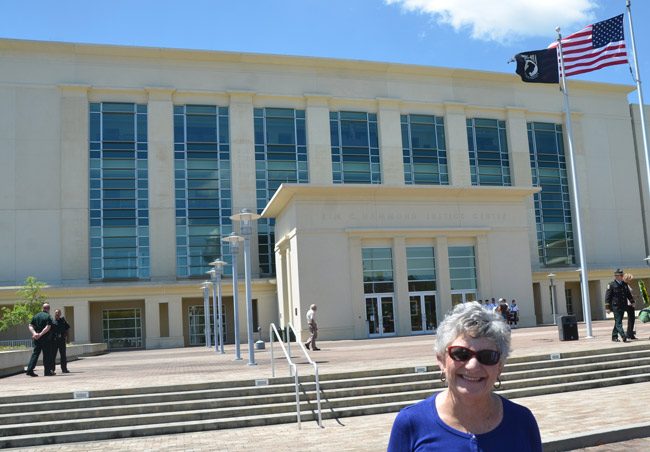
To take advantage of the two-week amnesty, check if you owe fines at the clerk’s site here, or call 855/895-8060 or pay online here.
![]()
A year and a half ago Florida’s clerks of court, including Flagler’s Gail Wadsworth, held a one-day amnesty for people whose overdue fines had gone to collection agencies. For that one day—April 17, 2015—people could pay their fines without incurring the 40 percent surcharge levied by collection agencies. They could also get their driver’s licenses reinstated.
Wadsworth’s office collected $25,385 in overdue fines—people could pay fines dating back to the mid-1990s—and reinstated 20 licenses, with an additional 79 eligible for reinstatement from other agencies. It’s not a large sum compared to the nearly $1.4 million owed the Flagler County Clerk of Court in thousands of cases. But it still made a difference.
The state, however, was not about to repeat what it called Operation Green Light annually, otherwise people would simply wait for the amnesty and pay then—not necessarily a bad thing from a consumer’s perspective. But the state’s collection agencies would be vehemently opposed, as it would be money out of their bottom lines.
Still, Wadsworth is holding the equivalent of Operation Green Light on her own again this year, and she’s doing so not for a single day but for two weeks, starting Monday (Sept. 19 through Sept. 30). She’s calling it Walk-In, Drive Out.
What’s enabling her to do that? The Flagler County Clerk of Court is switching collection agencies. The switch, Wadsworth says, opens a window of time residents can take advantage of.
The numbers are arresting. In last 12 months, Flagler County registered 1,083 criminal traffic violations. Of those, 387 were for knowingly driving on a suspended license. A license can be suspended for egregious traffic violations, but also for violating probation, for not paying traffic violations, child support or other obligations.
Fines start at $107, running up into the hundreds of dollars. (Wadsworth estimates the average owed fine at $200.) Add to that the late fees and the 40 percent surcharge and the total cost begins to approach the equivalent of a paycheck for many residents who live from paycheck to paycheck. It explains why fines often go unpaid: it’s a choice between that and perhaps more immediately necessary obligations. (Late fees would not be waived with late payments, only the 40 percent surcharge would be.)
“That’s a savings, for example, of $82.40 on a $206 ticket for going 10-15 mph over the speed limit,” Wadsworth’s website notes.
“There are so many people driving on a suspended license that it makes my stomach hurt,” Wadsworth said. “So if we can take 40 percent away, how many of them can pay the fees and fines they owe the state of Florida and have the opportunity to have their driver’s license back and have vehicle insurance? It all wraps up together.”
You can check here if you owe any fines by putting in your name where prompted. You may also pay online or by phone. Otherwise at the clerk’s office payments may be in cash (American currency only), check, money order or major credit card. Third-party checks will not be accepted. But people with big debts can also set up a payment plan and make payments—without the surcharge—past the two-week window, as long as they keep up with their payments. (Payment plans have been and will remain possible past the two-week amnesty.)
Wadsworth is changing collection agency after 15 years. “We in Flagler County, we have a really good rate of collection, in all those areas in which we’re required to collect,” Wadsworth said, “but if we could bump it a little, or if we could bump it a lot, we would put more dollars into all the state agencies that receive funding from what a clerk collects, including ourselves.”
Last year’s statewide amnesty collected $5.4 million in one day. Of that, $2.1 million went to the state’s general revenue fund, $1.7 million was distributed to local county and city governments, and $1.6 million went to clerks of court. “Most of the world thinks we get it all, and no, we don’t,” Wadsworth said. Whatever she collects will be split in the same proportions.





























Anonymous says
If Wadsworth submits a budget and is expected to live within her budget why would she get this extra money and it not go to the county General Fund since they pay part of her budget? This is nothing more than an example of getting rich quick!
carol says
How unjust, so those who obey the law and pay when due, gets the shaft? ugh!!!
Anonymous says
@ carol just asking how does this give the “shaft” to those who have no fines? This is to get those who do have fines in to PAY them without late charges. I think this will have more people paying off the fines and thus having more cash flow into the system with less cost to it/us then having it all go through the court and related posses to get the moneys.
Algernon says
Responding to the first two comments:
1) Money received to pay fines goes to the State of Florida. It doesn’t stay with the Clerk and is unavailable to the county.
2) People who pay their fines are still paying their fines. They are given grace on the penalty. No one is getting the “shaft”. Some people in unfortunate circumstances may not have paid anything because of the added collection fees – so this lets them pay the same fine as anyone else to help clear their record – IF they do it in the two week grace period starting Monday.
Ms. Wadsworth explained both on WNZF this morning.